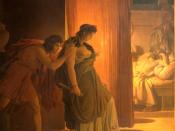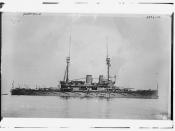Agamemnon: Power and Vengeance
In the world of Aeschylus, the lives of mortals are rocked by the emotions of a volatile and vengeful god. This human-like god Zeus is equipped with the power to wreak havoc on the lives of his mortal subjects. In Aeschylus' tragedy, Agamemnon, Zeus blesses and and encourages a vengeful ten year war waged by the twin kings Menelaus and Agamemnon against the city of Troy, sparking a cycle of continued infidelity and violence. This text reveals a rather perverse system of divine justice in which, at times, pride and revenge are valued more highly than human life.
The war against the city of Troy is waged because Menelaus is angry and embarrassed that his wife Helen ran away with Paris, yet the chorus makes it clear that this war is also one of divine justice. In a passage describing the war the chorus uses a simile to make the king's vengeful war seem justified and even holy.
Ten years since the great contestants of priam's right , Menelaus and Agamemnon my lord, twin throned and twin sceptered, in twofold power of kings from God, the Atreidae, the strength and the armies. Their cry of war went schrill from the heart as eagles, stricken in agony for young perished, high from the nest eddy and circle to bend and sweep of the wings stroke, lost far below the fledglings, the nest and the tendance. Yet someone hears in the air, a god, Apollo, pan or Zeus, the high thin wail of these sky guests, and drives late to its mark the Fury upon the transgressors, so drives Zeus the great guest god the atreide against Alexander: for one man's promiscuous sake . . . . You cannot burn flesh or pour unguents, not innocent cool tears,



Review of Zeus in Agamemnon
The Orestian trilogy has long been a favorite text of mine, and I am pleased that it is more frequently appearing as a topic on this site; However, I think this essay could be improved upon. The thesis is somewhat vague and overstated:
"...Zeus blesses and and encourages a vengeful ten year war... sparking a cycle of continued infidelity and violence. This text reveals a rather perverse system of divine justice in which, at times, pride and revenge are valued more highly than human life."
I would recommend making one main point and elaborating upon that until it is explained thoroughly. Your use of quotes is good, but may be a little overbearing at times. Try sticking to smaller quotes and interject your feelings into them. The essay is a little difficult to read because of the organization, but I am sure that if you revamp it a little bit, this could be a wonderful essay.
Cheers!
Scardia
6 out of 6 people found this comment useful.